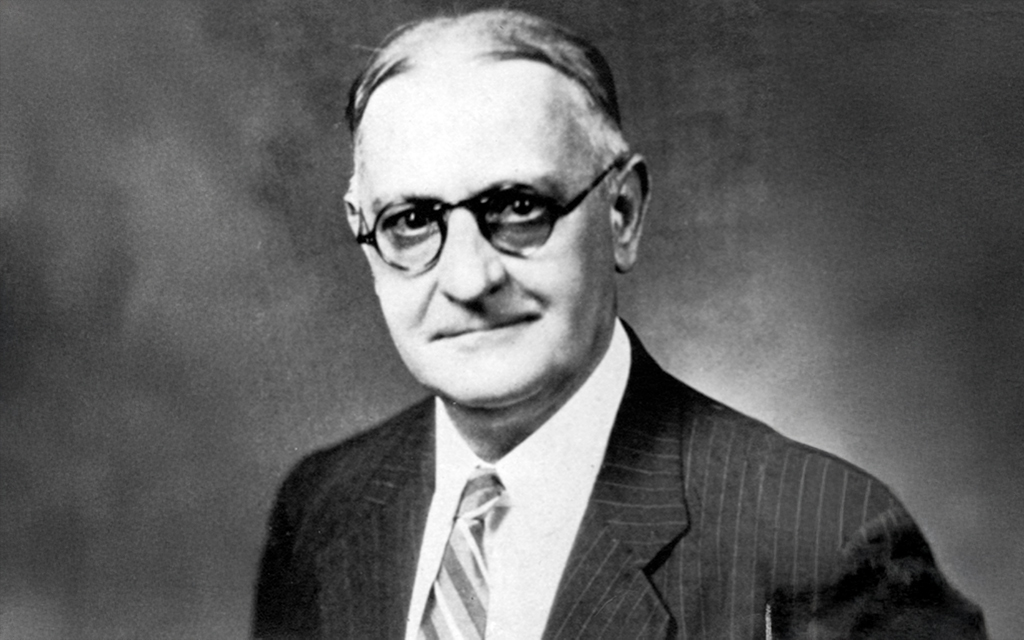Mississippi State’s eighth president, Hugh Critz, may have been the most reluctant leader in the institution’s history.
Born in 1876 as the oldest of seven children, Critz learned to handle horses and farm the land. Critz’s father, Wiley, earned his living running a livery stable and served as a part-time farmer to keep the family fed.
In 1891, Critz enrolled at Mississippi A&M, unsure of his career path. As a sophomore, engineering programs were introduced. He initially planned to pursue a degree in engineering but changed course and switched to agriculture the following year.
The spring of 1895 saw Critz earn a varsity letter in baseball under the direction of coach G.C. Creelman. Serving as the team’s second sacker, Critz earned the respect of his teammates. As a senior, he was voted team captain.
While baseball proved to be Critz’s sport of choice, there was also an ill-fated, short-lived run on the first Mississippi A&M football team.
Fascinated by the sport, Critz joined that inaugural squad only to discover that he did not enjoy being tackled. After one teeth-grinding hit, Critz decided that he would stick to baseball for his athletic pursuits.
Despite not sticking it out on the gridiron, Critz was part of an important decision that helped shape the future of Aggie, Maroon and Bulldog teams—he helped secure funding for the first-ever football uniforms and was among the number who voted that the team’s colors be maroon and white. In 1896, Critz graduated with a bachelor’s in agriculture and eventually found a home in education. His teaching career began in the Starkville public school system, but stops in Alabama, Arkansas and Tennessee were made before he returned home to Mississippi A&M as faculty.
The Mississippi Institutes for Higher Learning experienced some chaos during former Mississippi Gov. Theodore Bilbo’s second term.
What was later deemed “The Great Bilbo Purge” of 1930 saw multiple school presidents around the state terminated without cause, including Mississippi A&M’s Buz Walker.
At the time, Critz was working as the industrial commissioner for Mississippi Power and Light. Bilbo and his leadership team were curious if Critz was ready to return to education after a five-year hiatus.
Critz accepted the post with a sense of obligation and loyalty to his alma mater. His first order of business as the school’s new leader was to inform nearly 200 faculty members on the A&M campus that they were out of a job.
The strain of it all led to Critz offering his resignation to Bilbo. Critz’s request was denied.
While it took some time, Critz prepared for his new role with vigor. When the fall semester opened, the former Aggie baseball great was prepared to run the school to the best of his ability.
“The time for real work is here,” Critz told the Clarion Ledger. “I am going at it with enthusiasm.”
The simple truth was that dark days lay ahead, and Mississippi A&M needed the tender hand of guidance from one of her own.
Some retained faculty members went over a year without receiving compensation for their efforts. Only their love for the school and its students provided any sense of satisfaction.
Critz was extremely popular with faculty and students alike. During his tenure, he turned down the invitation to play former President George Washington in a student-led play. His obligations as the school’s leader during such uncertain times were simply too pressing to participate in the production.
Another school year led to another attempted resignation that was rebuffed, so Critz dug in to try to make his beloved school even better.
In 1932, Critz successfully pushed to change the school’s name from Mississippi A&M to Mississippi State College. With the advancements in curriculum and new fields of study, “Dear Ol’ State” was more than just an ag school. The new name reflected the diversity in degree programs.
The following year, Critz saw his son, Hughie, win a World Series with the New York Giants. The younger Critz was also an A&M baseball alum who served as the team captain on coach Dudy Noble’s first team in 1920.
On May 3, 1934, President Critz resigned from his position with Mississippi State College due to health problems. There was some chatter about him staying on as a faculty member, but those rumors never came to fruition. Duke Humphrey won a narrow state college board vote 5-4 to be Critz’s successor.
Critz left Starkville and, in his final years, he served as secretary for the Clarksdale Chamber of Commerce.
On Jan. 28, 1939, Critz passed away from a heart attack. His death was mourned by friends, family, and State alums all over the South.
Respected by all, his mark on Mississippi State is unmistakable and unforgettable. He helped lead the school through some troubled waters and left it on a much more solid footing.
Critz Hall bears his name out of respect for his legacy and contributions to Mississippi State. One could say that Hugh and Hughie Critz are the most accomplished and distinguished father-son tandem in the university’s history.
Editor’s note: Read more about Hugh, Hughie, and so many others in Robertson’s biography of Dudy Noble, “The Dude: The Life and Times of Dudy Noble.” This book, along with Robertson’s other titles, can be ordered at dudynoblebook.com.
A Mississippi native, Steve Robertson has been a professional writer since 1997. He is well known to the Bulldog faithful as a frequent contributor to MSU sports media, including fan site Gene’s Page, the “Out of Bounds” radio show, “The Bone Yard” podcast and other fan-loved outlets. His books, which are mainstays on lists of Mississippi’s bestsellers, include “Dawg Pile,” “Alpha Dawgs,” “Flim Flam” and “Stark Villains.”




